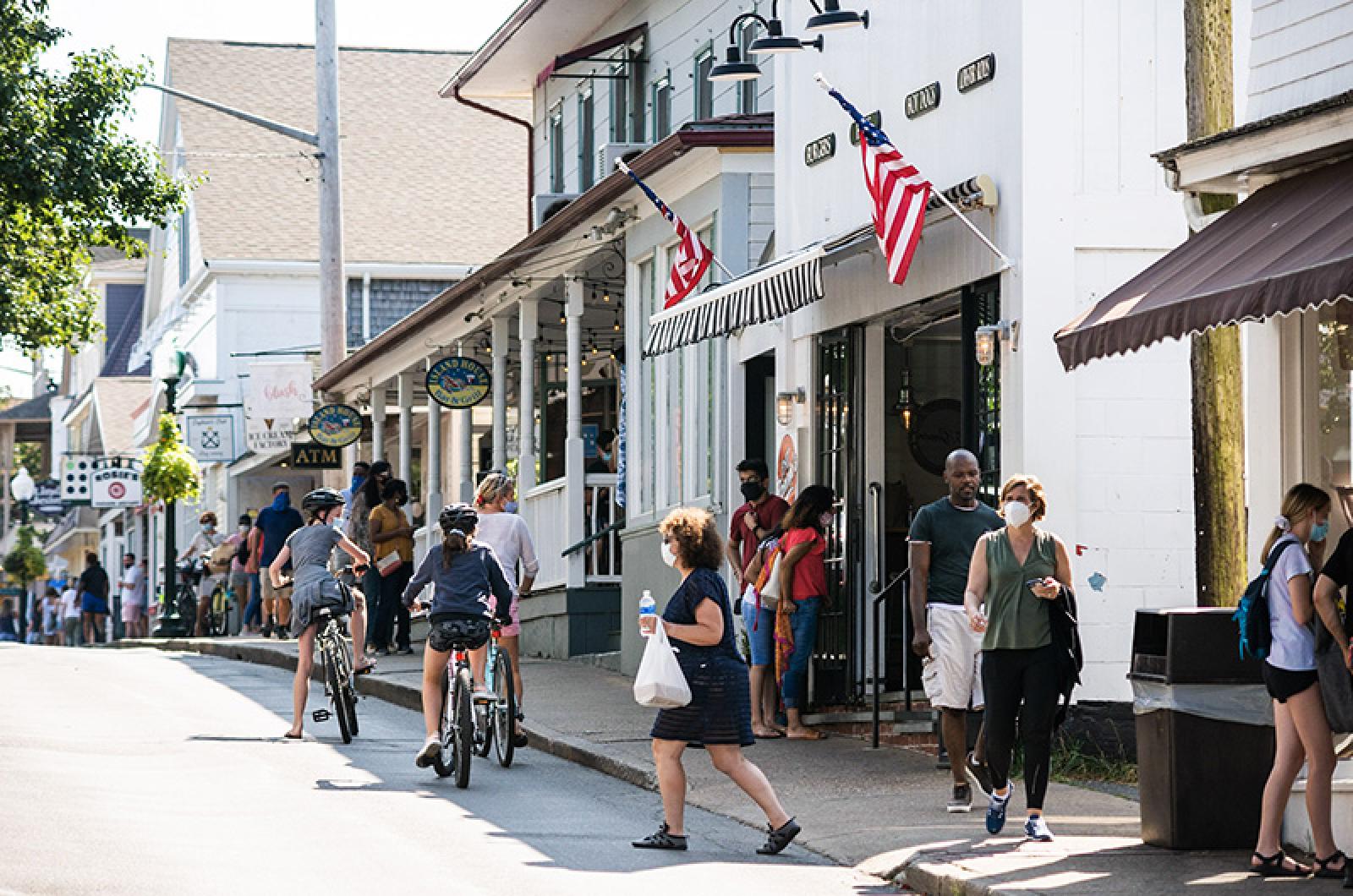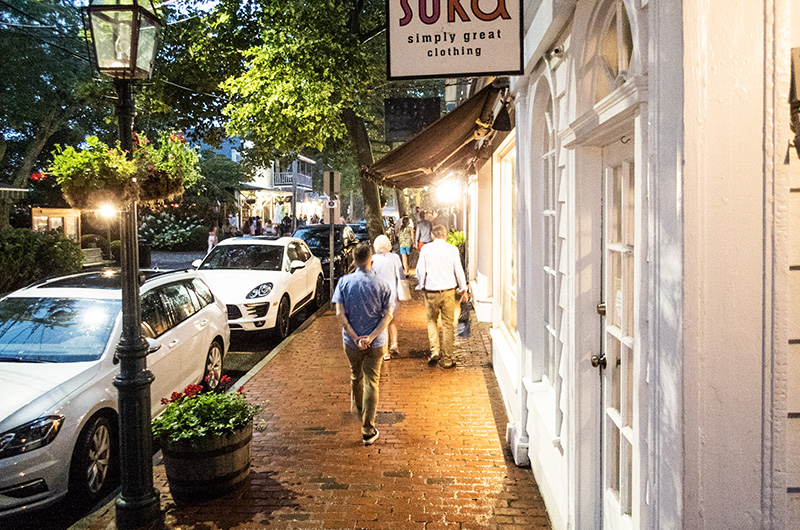When the pandemic hit back in mid-March, Behind The Bookstore — a cozy, boutique coffee shop tucked literally behind a bookstore off Main street Edgartown — knew it had a problem. Indispensable but stateless barista, Mikhail (Misha) Sebastian, was traveling through Africa on one of his annual voyages to the birthplace of coffee. With international flights curtailed, the shop didn’t know if he would make it back.
“Our barista was overseas, and his repatriation flight was postponed maybe three or four times,” said director of operations and chef Gustavo Aguiar. “We didn’t know if we were going to be able to open at all.”
Finally able to open in June and benefiting from a large outdoor seating area, Behind the Bookstore is breathing fresh air and a sigh of relief six months later. Although staffing and capacity issues, as well as a noticeable decline in foot traffic, have hurt business — putting revenues at about 80 per cent of last summer — Mr. Aguiar said the shop has survived the worst of the pandemic.
“Taking all that into account, I think it was a pretty good summer,” Mr. Aguiar said. “I went in saying if we break even, we’ll be good. And we are going to do much better than that.”
In interviews with more than 20 retail and food businesses on the three down-Island main streets, owners and managers, fearful that they wouldn’t be able to open at all at the beginning of summer, largely agreed that they avoided their gravest prognostications by the end of it. And despite a lost spring and an unprecedented shutdown that forced closures long into the summer, most said reopening in July and August allowed them to catch up.
Businesses that prospered — or at least survived — did so largely through factors outside their immediate control, including the size and layout of their space (the more outdoorsy the better) and their particular inventory (again, the more outdoorsy the better). Loan and rent forgiveness, delivery and online capabilities and a surprisingly busy summer for tourism helped as well. Businesses that struggled were similarly hampered by things out of their control. Hardest hit were those that depend on foot traffic, small purchases and customer spontaneity, or trade in formal wear.
Most retail business interviewed reported a drop in revenue and concerns about the fall, and a few will likely have to close their doors or keep them shut, citing staffing shortages, capacity limits and a noticeable decline in day trippers and out-of-state travelers. But many repeated the same refrain when asked to describe the summer of 2020: it could have been worse.
“This is the summer of survival,” said Alex McCluskey, co-owner and manager of the Locker Room, a sports memorabilia store in Oak Bluffs. “It turned out a lot better than I expected.”
In Vineyard Haven, the Island’s main port town, a steady stream of visitors and seasonal residents that arrived starting in June quelled initial fears about the summer and brought unexpected success for a number of retailers on Main street, who reported sales figures just below those of past years.
LeRoux, a kitchen and home goods retailer which experienced a lull in early June as Main street slowly reanimated, saw steady business in July and August, according to co-owner Michael Levandowski.
“Initially, it was a huge challenge — lots of confusion, lots of concerns,” Mr. Levandowski said. “But as time went on, June progressively built stronger and stronger as people felt more and more comfortable . And then in July and August, it was almost normal.”
Across the street at Rainy Day, owner Melissa Scammell was pleased to see steady, albeit slightly below average, sales this season, after worries of bringing in only half the store’s usual summer revenue.
“The first few days we opened after being closed for several months, we literally had people skipping out of the store,” said Ms. Scammell. “I think people are just enjoying shopping this summer.” Both LeRoux and Rainy Day reported a lower volume of customers this summer than in past years. But the slack was offset by a skyrocketing online and delivery business, which Mr. Levandowski said went up by 350 per cent, as well as
a recent trend of shoppers buying bigger ticket items and making larger net purchases.
“If you look at our average ticket, our ticket value has gone up,” said Mr. Levandowski, who attributed the trend to a surge in buyers looking to make specific long-term purchases. “People come in with the mission, it’s not a lot of lookers. They know exactly what they want, they buy it, they leave.”
For other retailers, like the Green Room in Vineyard Haven and Boneyard Surf Shop in Edgartown, their particular inventory drove sales this summer. Green Room owner Elaine Barse said she sold out of paddleboards early in the season. Boneyard manager Rachael Convery said the store sold out of surfboards and swim trunks too, as buyers working from home gravitated toward outdoor gear and equipment, as well as casual wear.
Soft As A Grape, unsurprisingly, saw a boom in sweatpant sales.
“Our industry kind of exploded,” Ms. Convery said. “We would have been able to sell twice as many surfboards this summer if we had more of them. We just ran out of stuff. People were t
hinking we weren’t going to have a summer. And then we opened up, and it was insanity.”
In Oak Bluffs, Avi Benjiman, owner of Reel Island Clothing Company, said his landlord gave him rent relief in May, which allowed him to continue through the summer. Mr. McCluskey said baseball and basketball card sales soared at the Locker Room, buoying his business after landlords expressed a similar willingness to forgive pandemic payments.
“That really saved my summer, I was very fortunate,” he said.
But challenges like capacity limits inside stores and slower than normal foot traffic, as well as extreme staffing shortages, meant that even businesses like the Boneyard, Le Roux and Rainy Day saw revenue declines in 2020.
Travel restrictions on foreign labor, including J1 students and H2B visa recipients, as well as large unemployment benefits that kept some American workers home, forced almost all businesses to operate with about half their normal staff. Both Mad Martha’s Ice Cream and Vineyard Vines, with locations on all three down-Island main streets, shuttered their Vineyard Haven stores. Others had to cut their hours. Few businesses stayed open late.
In Oak Bluffs, business faced a particular difficulty caused by the delayed opening of the town’s Steamship Authority pier. Stores like South Beach Sunglasses and First Impressions said they saw far less traffic than prior summers in part because of the month-long delay.
Other businesses faced more dire declines. Owners at Glimpse of Tibet said they were “standing hollow,” meaning that the store still existed, but that there wasn’t much to show for it. Luke Debettencourt, owner of the Corner Store, said traffic was down about 50 per cent less from last year, with revenues down 40 per cent.
“And we carry necessities,” Mr. DeBettencourt said. “It’s been challenging . . . we’re looking at preserving the business for next season.”
Art dealers, jewelry stores, tourist and antique shops — normally summer stalwarts — said they had particularly challenging seasons, with no bus tours, social distancing restrictions and less foot traffic making business inconsistent and survival perilous.
“There’s no comparison to past seasons,” said Gwenn Bukowiec, who owns Vintage Jewelry in Edgartown. “It’s definitely way off.”
At Vineyard Arts Gallery in Vineyard Haven, owner Robin Canha said sales at the gallery this August were down 71 per cent from the previous year. Without day-trippers Ms. Canha said she struggled to make the small, everyday sales, like candles and mugs, that keep the business afloat.
And with mounting uncertainty about the fall and the usual seasonal milestones like back-to-school shopping, Black Friday and even Christmas a question mark, many stores that survived the lean summer are bracing for a barren winter. Outdoor businesses, like Behind The Bookstore, are worried about the changing weather. Others are simply worried.
Ms. Canha plans to close the Main street gallery in September, taking her business entirely online until the pandemic is over.
“I’ll re-open when there are no masks,” she said.
And when asked whether they thought Main street would look different in the summer of 2021, most business owners quietly nodded in agreement — unsure, but fearful, of what the future holds.
“Basically, you are in survival mode,” Ms. Bukowiec said. “You either make it or you don’t. Those are your choices.”











Comments (1)
Comments
Comment policy »